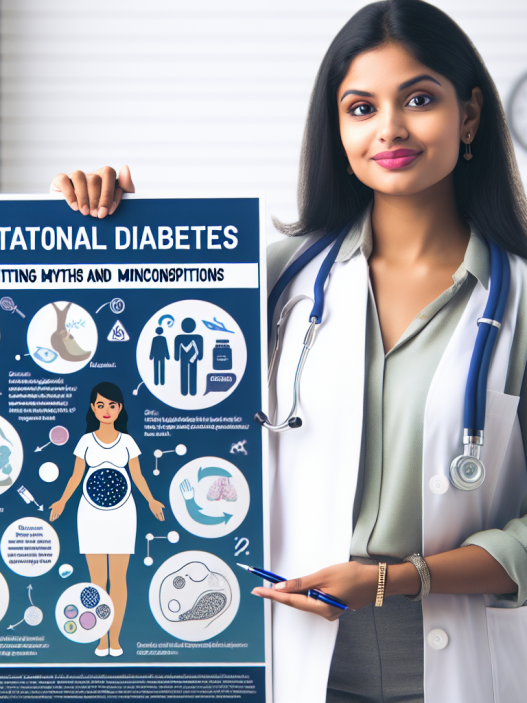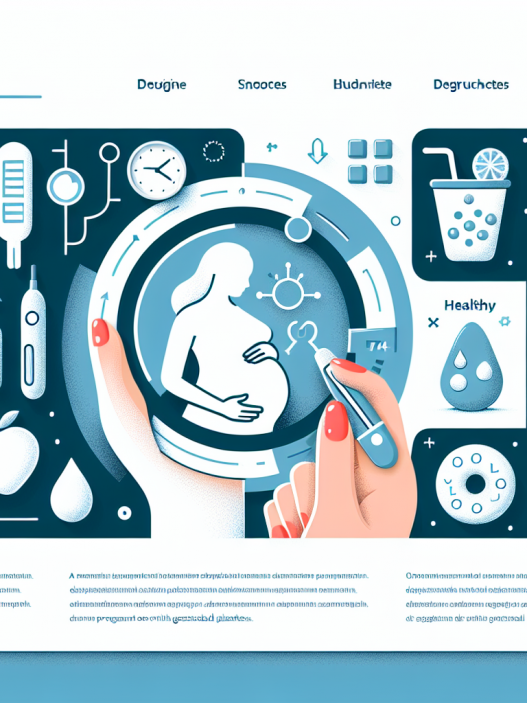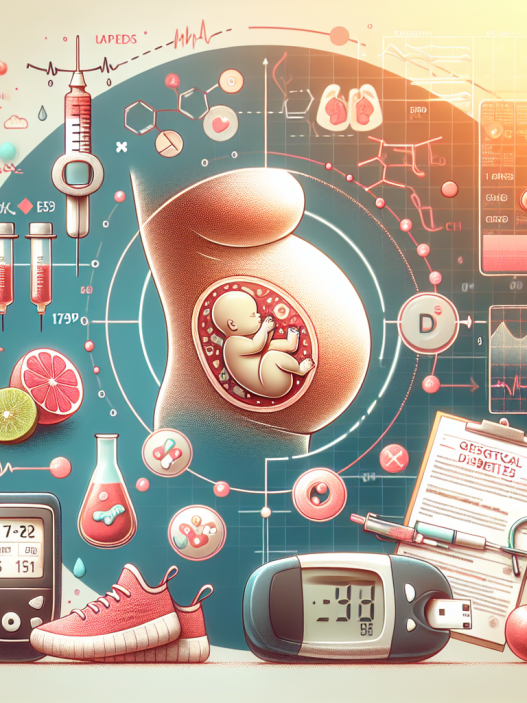[ad_1]
Pregnancy is an incredibly transformative journey, filled with excitement and anticipation. However, for some expecting moms, conditions like gestational diabetes can add complexity and concern to this remarkable experience. Understanding the impact of gestational diabetes on pregnancy is crucial for the health of both mother and baby. In this comprehensive guide, we will explore what gestational diabetes is, its implications during pregnancy, and essential tips for managing it effectively.
Understanding Gestational Diabetes: What Expecting Moms Need to Know
Gestational diabetes occurs when a woman, who has never before had diabetes, develops high blood sugar levels during pregnancy. It typically arises around the 24th week of pregnancy and can affect both the mother and child. While the exact cause of gestational diabetes is not fully understood, it is believed that hormonal changes during pregnancy can inhibit insulin’s effectiveness, leading to elevated glucose levels in the bloodstream.
Gestational diabetes is often asymptomatic, and many women may not know they have it until routine screening tests during pregnancy. However, if left unmanaged, it can lead to several complications that can affect both the mother’s and baby’s health. Understanding the risks associated with this condition is essential for expecting mothers to ensure they take the necessary steps to safeguard their health and that of their child.
The Causes and Risk Factors of Gestational Diabetes
Several factors can contribute to the development of gestational diabetes during pregnancy. One prominent factor is obesity, as excess body weight puts added pressure on the body’s ability to utilize insulin effectively. Additionally, women with a family history of diabetes or who have previously experienced gestational diabetes are at a higher risk of developing the condition during subsequent pregnancies.
Age can also play a significant role; women over the age of 25 are at greater risk, especially those who are 35 and older. Furthermore, ethnicity is a factor, with certain groups, such as African Americans, Hispanic/Latino Americans, Native Americans, and some Asian Americans, having a higher propensity for develop gestational diabetes. It’s vital for expecting mothers to stay informed about these risk factors and discuss them with their healthcare providers during prenatal visits.
Another important aspect to consider is lifestyle. Sedentary habits and poor dietary choices can contribute to insulin resistance, thereby increasing the likelihood of gestational diabetes. Engaging in a balanced diet rich in whole foods, fruits, vegetables, and whole grains, coupled with regular physical activity, can help lower the risk. Being proactive and maintaining a healthy lifestyle before and during pregnancy can significantly impact the chances of developing gestational diabetes.
Complications of Gestational Diabetes for Mother and Baby
Gestational diabetes can lead to various complications if not managed properly. One of the primary concerns for mothers is the potential for elevated blood pressure, which may result in preeclampsia, a condition characterized by high blood pressure and potential damage to other organs. Furthermore, women who have had gestational diabetes are at a higher risk of developing type 2 diabetes later in life, even after the pregnancy has ended.
For the baby, gestational diabetes can lead to excessive growth, known as macrosomia. This condition can increase the likelihood of complications during delivery, including a higher risk of cesarean section. Additionally, infants born to mothers with gestational diabetes may experience low blood sugar levels after birth (neonatal hypoglycemia), along with increased chances of developing obesity or type 2 diabetes as they grow older.
Moreover, babies delivered to mothers with poorly controlled blood sugar can also face respiratory complications and jaundice. Recognizing the potential complications can motivate expecting mothers to seek timely treatment and adhere to recommended management strategies to ensure a healthy pregnancy outcome for themselves and their babies.
Management and Treatment of Gestational Diabetes
The management of gestational diabetes involves a comprehensive approach that includes blood sugar monitoring, dietary modifications, physical activity, and, in some cases, medication. Blood sugar levels should be regularly monitored throughout the day to keep track of how food and activities affect glucose levels. Expecting moms should work closely with their healthcare providers to establish an appropriate monitoring plan that meets their individual needs.
One crucial aspect of managing gestational diabetes is diet. A well-balanced meal plan consisting of complex carbohydrates, lean proteins, and healthy fats plays a vital role in controlling blood sugar levels. Expecting mothers should focus on consuming whole foods and limit processed sugars and refined carbohydrates. Consulting with a registered dietitian can provide tailored guidance on meal planning and portion control.
Exercise is another essential component of gestational diabetes management. Engaging in moderate physical activity for at least 30 minutes a day can help regulate blood sugar levels and is beneficial for both mother and baby. Activities such as walking, swimming, and prenatal yoga can safely integrate into a daily routine. Ultimately, healthcare providers can recommend a management plan that prioritizes the well-being of both the expectant mother and her unborn child.
Emotional and Mental Health Considerations
Managing gestational diabetes can be a challenging experience, often leading to feelings of anxiety and stress for expecting mothers. The fear of complications and the constant need for blood sugar monitoring can take a toll on one’s mental health. It’s essential to acknowledge these feelings and seek support from healthcare providers, family, and friends. Mental well-being is as crucial as physical health during pregnancy.
Support groups can be a tremendous resource for women facing gestational diabetes. Having a community of individuals who share similar experiences can alleviate feelings of isolation and provide valuable tips and encouragement. Many hospitals and clinics organize support groups where pregnant women can connect and share their challenges and triumphs.
Additionally, mindfulness practices such as meditation and deep breathing exercises can help manage stress. Finding ways to relax and care for one’s mental health during pregnancy is vital in achieving overall wellness. Before implementing any new strategies, pregnant women should discuss them with their healthcare providers to ensure they complement their management plan.
Postpartum Considerations and Care
After childbirth, many women with gestational diabetes may find that their blood sugar levels return to normal. However, it’s essential to continue monitoring blood glucose levels for the first few weeks postpartum and ensure regular follow-up appointments with healthcare providers. Women who had gestational diabetes are at increased risk of developing type 2 diabetes later on, making post-pregnancy care critical.
Breastfeeding can also play a role in maintaining healthy blood sugar levels. Studies have shown that breastfeeding can help lower the risk of developing type 2 diabetes and may also contribute to weight loss following pregnancy. Expecting moms should be encouraged to breastfeed for as long as they can, as it has numerous benefits for both mother and child.
Lastly, staying committed to a healthy lifestyle post-pregnancy can help mitigate the risks associated with gestational diabetes. Regular check-ups, a balanced diet, and an active lifestyle can make a significant difference. Women should also educate themselves about the warning signs of type 2 diabetes and discuss any concerns with their doctors during follow-up visits. Being proactive about one’s health at this stage can lead to a greater overall quality of life.
In conclusion, understanding the impact of gestational diabetes on pregnancy is vital for expecting moms. By recognizing the risks, managing diet and lifestyle, and seeking support, women can navigate this condition with confidence while ensuring the well-being of their children. Knowledge and preparation are key to turning challenges into opportunities for positive health outcomes.
[ad_2]





















